
WhatsApp has become one of the most popular communication tools in the world with over 2 billion active users. It is a simple and user-friendly app that can be used for instant messaging, voice and video calls and file sharing. The app's versatility has made it an ideal tool for businesses, including those in the real estate industry. This article will discuss the benefits of using WhatsApp for real estate, as well as why you should connect it to respond.io. Finally, we’ll share some best practices on how to use WhatsApp business for real estate.
What is WhatsApp for Real Estate?
WhatsApp for real estate refers to the use of WhatsApp as a tool to facilitate communication and collaboration between real estate agents, buyers, sellers, and other stakeholders in the real estate industry.
Real estate agents can leverage WhatsApp to quickly respond to client inquiries and provide personalized service, ultimately leading to increased customer satisfaction and improved sales performance.
Benefits over Traditional Channels
One of the key reasons why WhatsApp is a popular choice for real estate professionals is its widespread popularity. With over 2 billion active users worldwide, WhatsApp is the most widely used messaging app in the world.
This means that real estate agents can connect with clients and prospects on a channel they are already familiar with, which can help to build trust and make communication easier.
Overall, WhatsApp is a versatile and convenient tool for real estate professionals that offers several advantages over traditional messaging channels such as SMS or email.
Let’s start with its instant messaging capabilities. Real estate agents can use WhatsApp. to quickly respond to client inquiries and provide timely updates on properties, which is especially important in the fast-paced world of real estate.
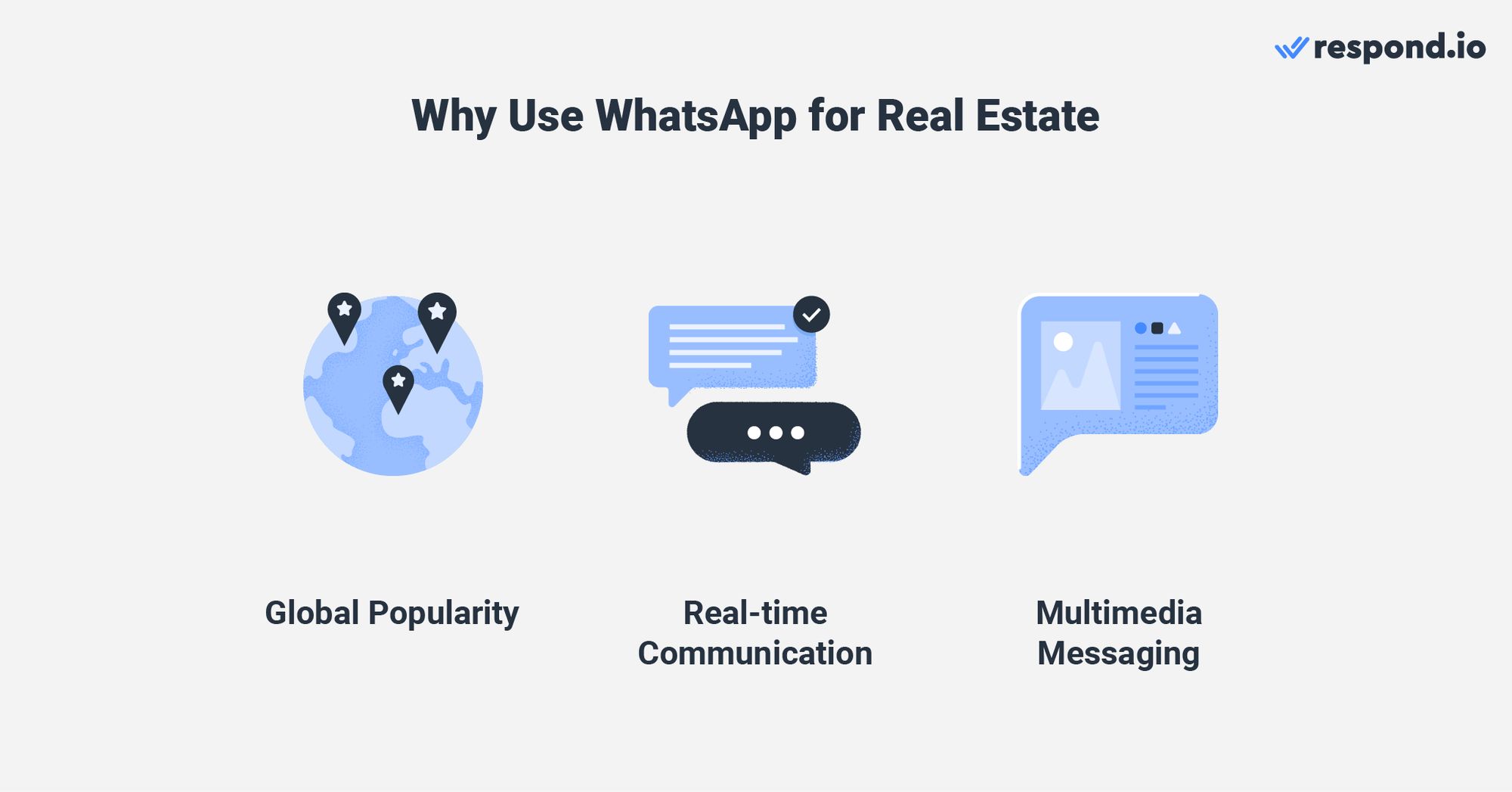
It allows them to stay connected with clients and prospects in real time, which can help to speed up the sales process.
WhatsApp also offers multimedia messaging capabilities so real estate agents can send photos and videos of properties to clients and prospects. This is a powerful way to showcase properties and give clients a better sense of what they are looking at to increase interest and ultimately lead to more sales.
Lastly, using WhatsApp can help real estate agents establish a better rapport with potential clients, which can lead to better customer satisfaction. Now that you are familiar with the benefits, let’s go through how to use WhatsApp for Real Estate.
WhatsApp for Real Estate: How to Use it
For a start, real estate agents can use WhatsApp to receive property inquiries from potential buyers or tenants, fostering quick and direct communication.
Tailored to client segments, WhatsApp Groups on the WhatsApp Business App enable targeted communication and information sharing, making it effortless to connect with investors or buyers seeking properties in specific locations.
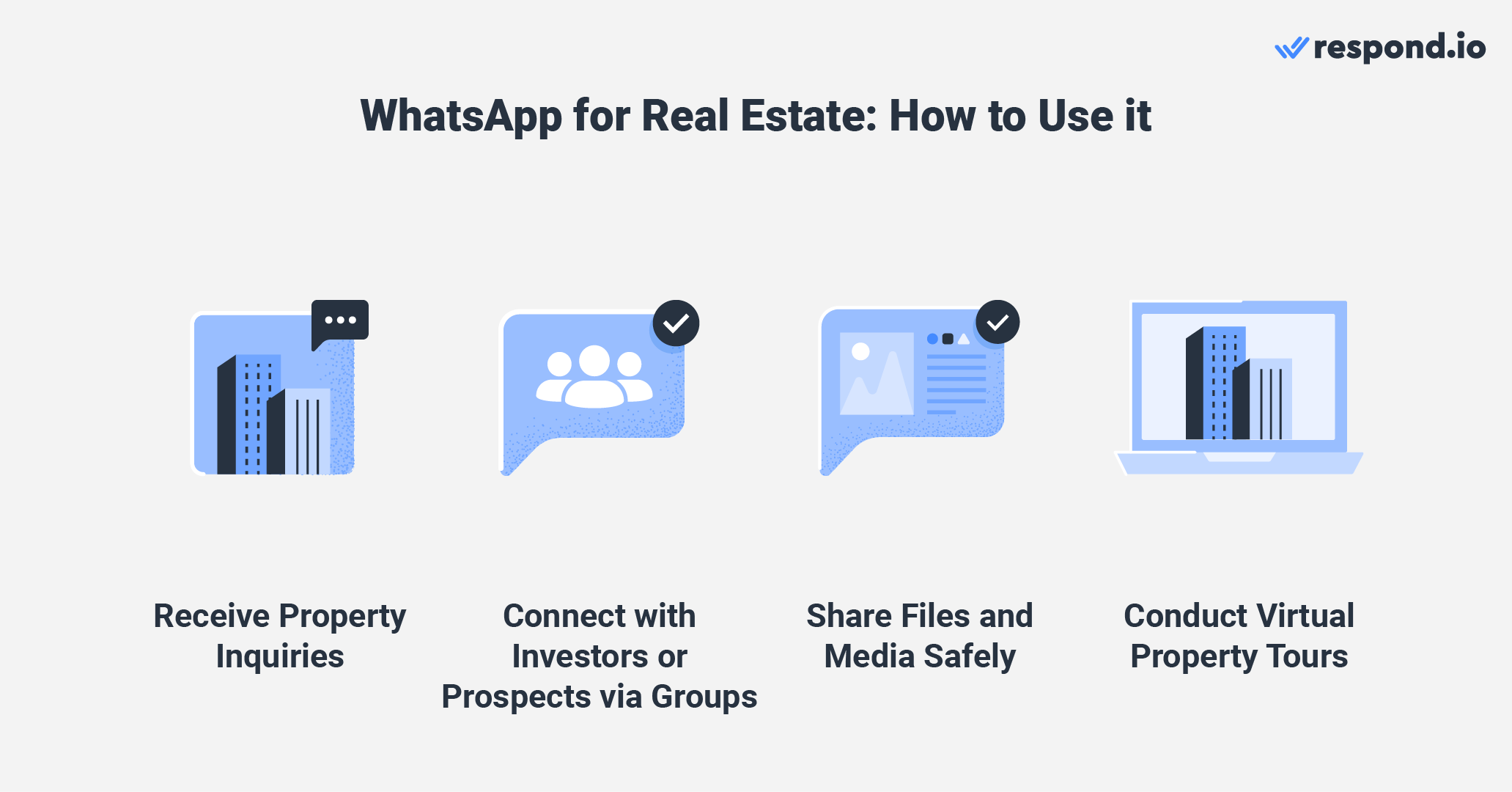
With its secure platform, WhatsApp facilitates the seamless sharing of vital documents like contracts, agreements and property information sheets, ensuring privacy and efficient transactions.
Leveraging the video call feature, agents conduct immersive virtual property tours, allowing clients to remotely explore properties in real time and inquire about details. Next, we’ll show how a successful real estate company uses WhatsApp for customer communication.
Success Story: How Sotheby Uses WhatsApp for Real Estate
Sotheby's International Realty, a renowned luxury real estate brokerage, has seamlessly incorporated WhatsApp into its communication strategy to enhance client engagement and facilitate real estate transactions.
The company shares property listings and captivating details through WhatsApp, providing clients with visually rich experiences and the ability to explore properties remotely.
Moreover, WhatsApp serves as a platform for virtual property tours, allowing clients to engage in immersive property viewings through live video or pre-recorded walkthroughs.
This direct communication channel also facilitates efficient and personalized interactions between Sotheby's agents and clients, enabling real-time discussions, clarifications, and updates on property-related matters.

Furthermore, WhatsApp proves instrumental in facilitating various aspects of real estate transactions, including document sharing, coordinating property viewings, scheduling meetings, and providing transaction updates.
By integrating this channel into its communication strategy, Sotheby's International Realty aims to deliver a seamless and personalized experience for clients throughout the real estate buying or selling process.
If you’re determined to use WhatsApp for your real estate business like Sotheby does, do not miss the next section. We’ll share some best practices to make the most out of WhatsApp’s capabilities.
Turn conversations into customers with respond.io's official WhatsApp API ✨
Manage WhatsApp calls and chats in one place!
WhatsApp for Real Estate: Best Practices
The WhatsApp Business App is designed with micro and small businesses in mind. Real estate businesses should use a WhatsApp solution for multiple users to manage conversations at scale. Their best choice is to apply for a WhatsApp API account.
As WhatsApp API has no interface, it needs to be connected to a messaging inbox or software to send and receive messages. Respond.io is a customer conversation management software that allows businesses to manage all their messaging channels in one place.
Whether you are a respond.io user or not, you’ll find this section useful. We will discuss some of the best practices you can adopt when using respond.io WhatsApp Business API for the real estate industry.
Message Through Any Channel with an Omnichannel Inbox
An omnichannel inbox is more convenient than a WhatsApp inbox, as customers often contact real estate agencies from different messaging channels.
Respond.io's omnichannel inbox allows businesses to manage all their customer inquiries from messaging channels like WhatsApp, Facebook Messenger and Telegram in one place.
This centralization can help agents respond to inquiries more efficiently and reduce the likelihood of missing any inquiries.
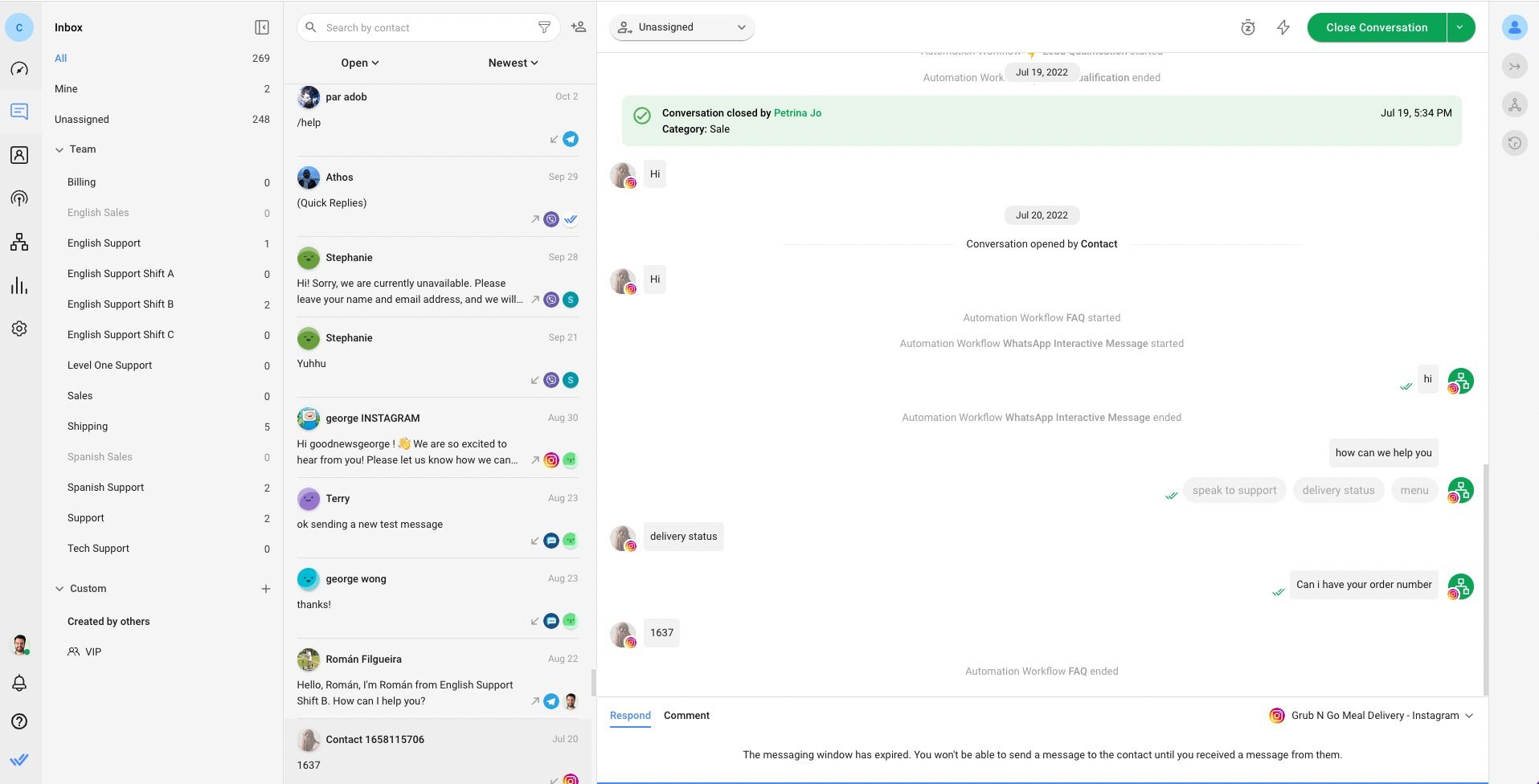
Realtors can improve customer satisfaction and loyalty by providing a seamless and consistent customer experience across all messaging channels. But occasionally, a Contact messages the business from different channels, which creates duplicated profiles. Let’s see how to quickly fix this issue.
Correctly Identify Contacts on Any Channel
Merging Contacts allows businesses to identify and join duplicate customer profiles and consolidate all of a customer’s information in one place. This helps agents access all relevant information about a customer, including previous inquiries, preferences and history, leading to better customer service.
With this feature, real estate agents can eliminate duplicate customer profiles and ensure that all customer data is accurate and up-to-date, so real estate businesses can avoid communication errors and improve overall customer data quality.
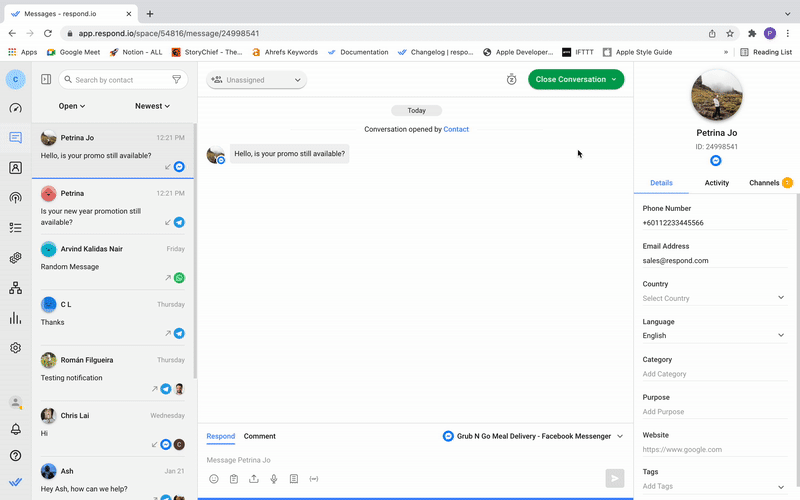
Merging contacts also helps agents streamline customer communication, as they only need to manage one customer profile instead of multiple profiles. This can lead to more efficient communication and reduce the likelihood of missed messages.
Take Advantage of AI Agents
Respond.io provides AI Agents that handle customer calls and chats across multiple channels, all from a single inbox.

With the right setup, AI Agents can greet prospects, resolve common inquiries, trigger workflows, add internal comments, qualify leads and even handle 24/7 voice calls through Voice AI Agents before escalating complex cases to human agents.
WhatsApp for Real Estate: Automate Common Processes
Many of the common processes performed by real estate businesses can be streamlined when you connect WhatsApp API to respond.io. Here are some examples.
WhatsApp Business for Real Estate: Lead Collection
WhatsApp offers a few chat entry points for customer conversations. For example, a real estate business can generate a WhatsApp link and embed it on its website to collect leads. In contrast, businesses seeking to collect leads from their physical location can do it with a WhatsApp QR code.
A WhatsApp widget is another effective way to convert website visitors into WhatsApp leads. Since respond.io also has an omnichannel widget, real estate businesses can add other popular messaging channels to provide customers with more options.
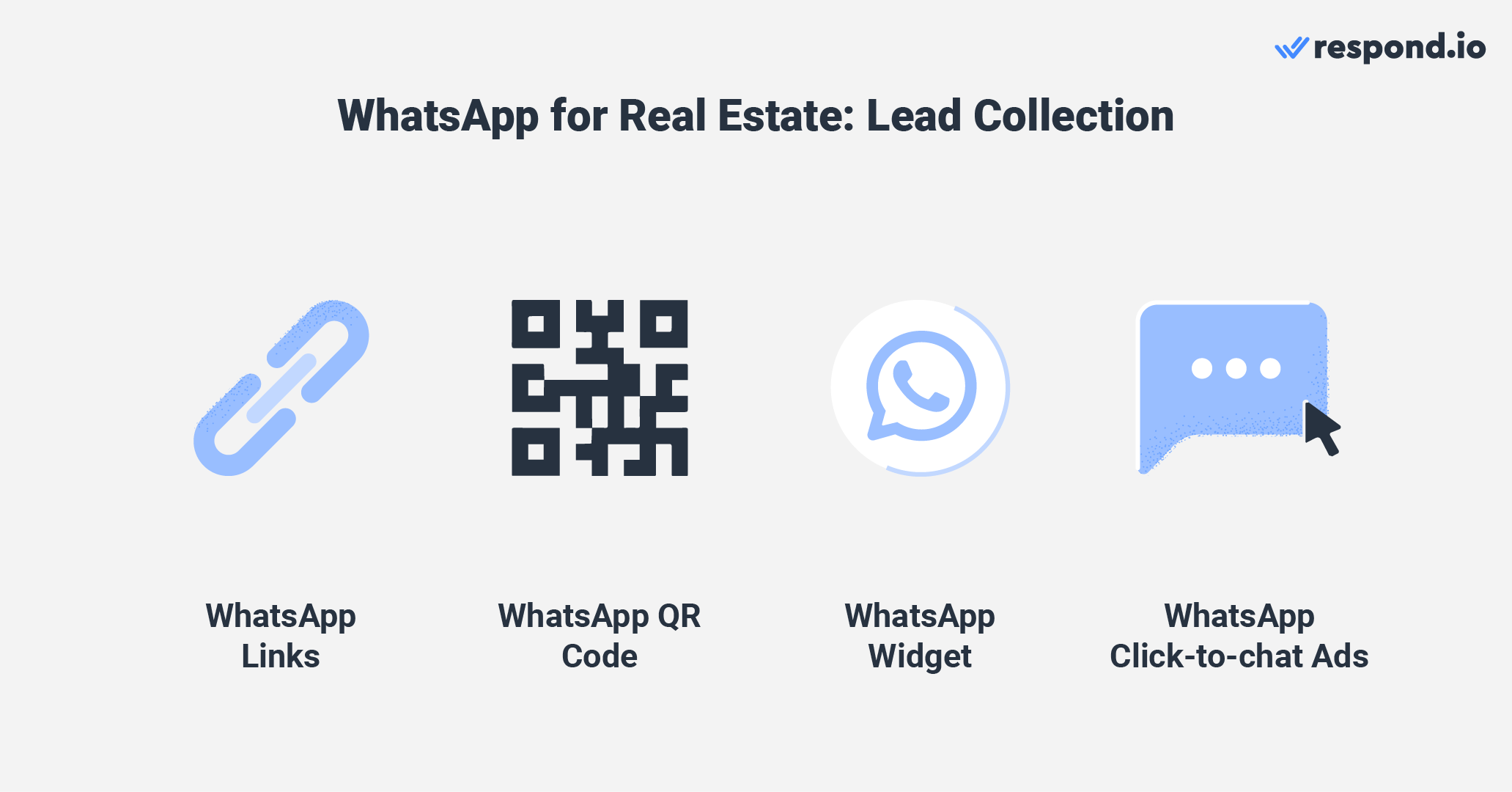
Alternatively, you can run WhatsApp click-to-chat ads to generate leads from Facebook and Instagram. For example, offer a free consultation or property evaluation for anyone who contacts you via WhatsApp.
WhatsApp Business for Real Estate: Answer FAQs with a WhatsApp Menu
To answer common real estate questions with a FAQ menu, you can start by identifying the recurrent customer inquiries such as financing options, types of properties available, and the buying process.
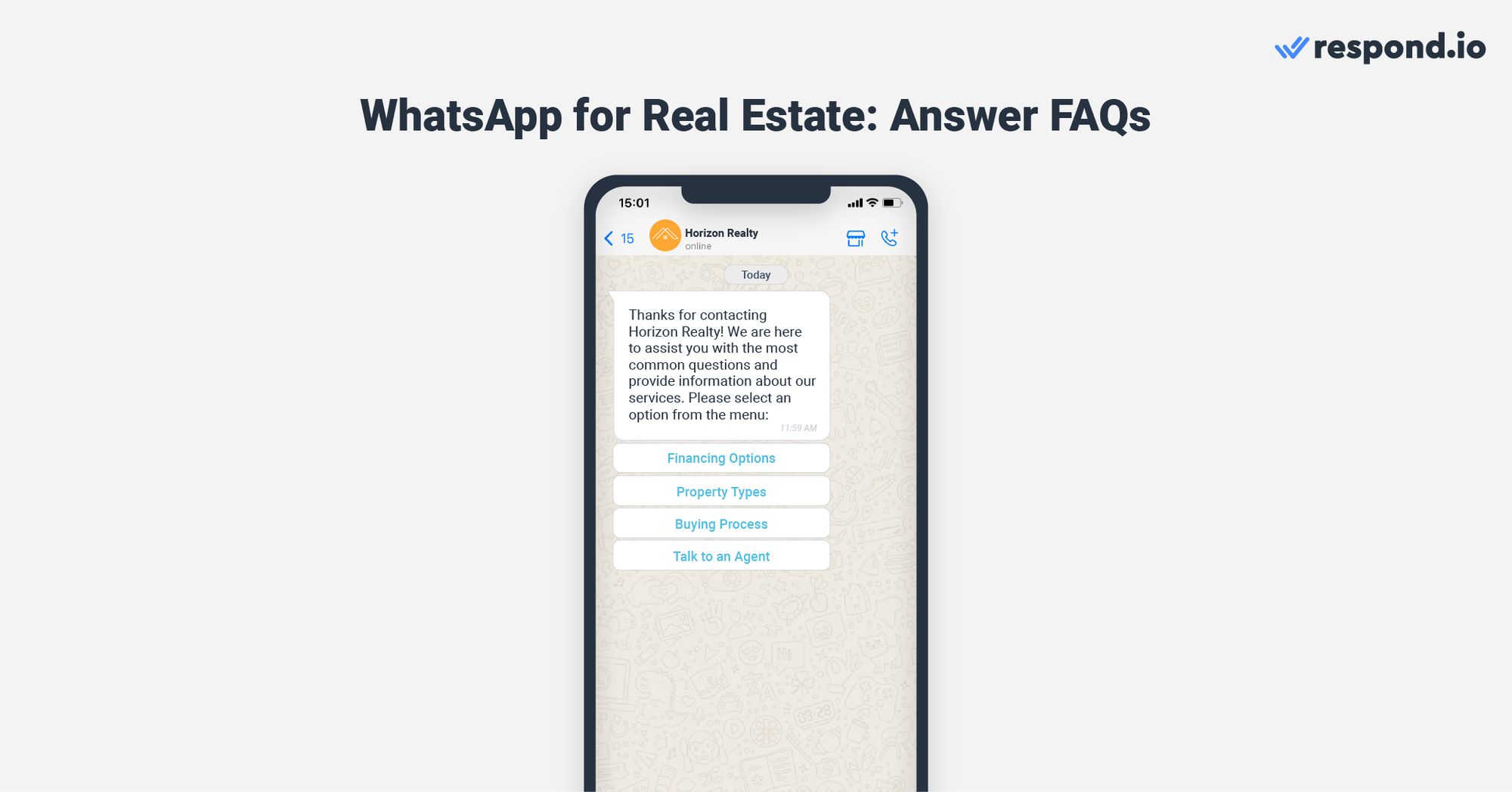
Then, build the FAQ menu using Workflows, respond.io’s automation builder. Once the menu is set up, customers can interact with it by selecting the question they want to know more about. Then, they should get the relevant information instantly or get directed to an agent who can answer their question in more detail.
WhatsApp Business for Real Estate: Automate House Viewing Appointments
Develop an interactive Workflow that can guide leads through the process of scheduling an appointment for house viewing. The Workflow could ask a series of questions to gather information about their preferences and then suggest available dates and times for the viewing.
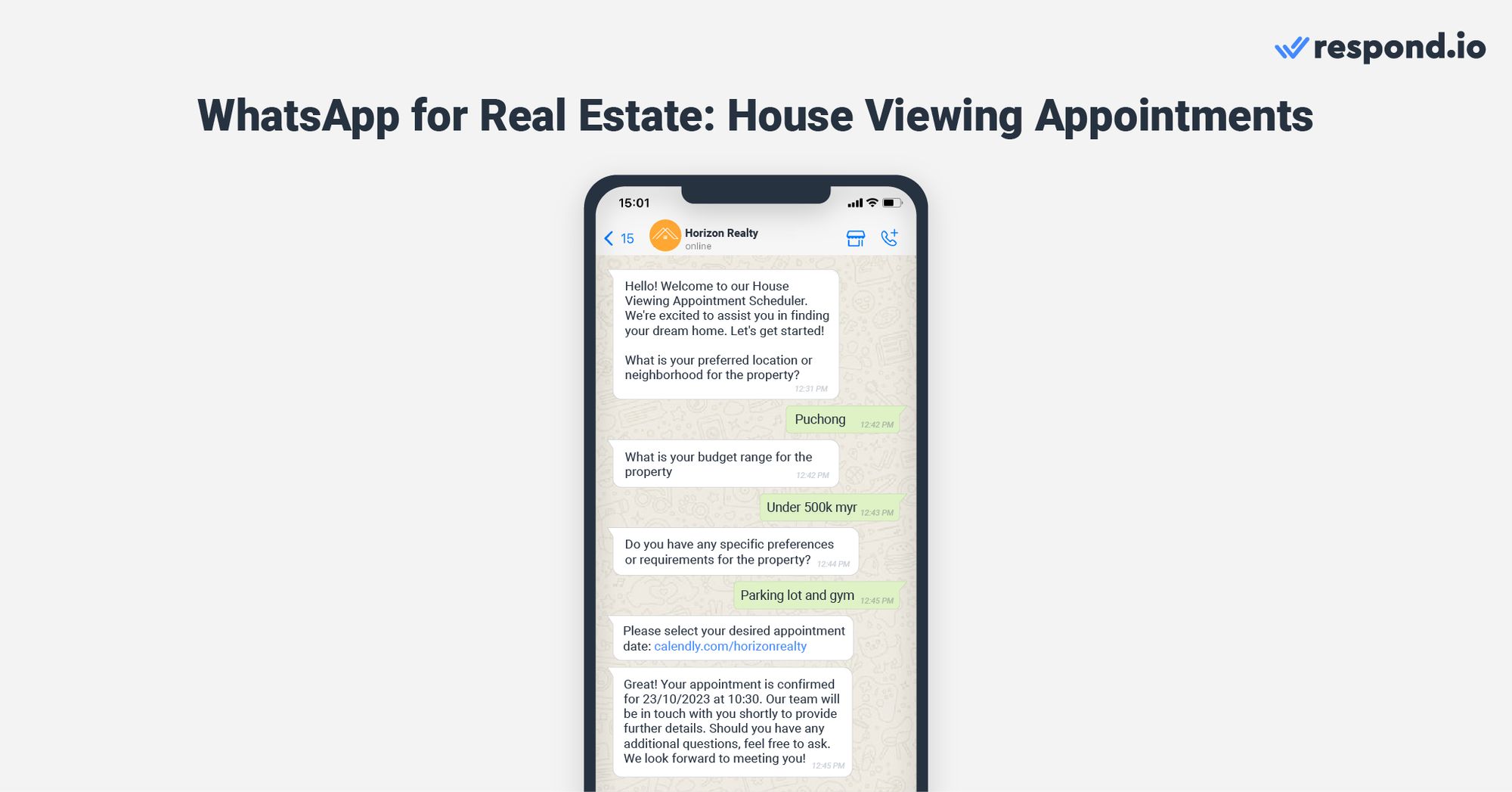
If the house has a virtual tour available, integrate it into the WhatsApp Workflow so leads can view the house before scheduling an in-person appointment. This could help to save time and reduce the number of unnecessary appointments for agents.
WhatsApp Business for Real Estate: Send Follow-up Notifications
Build a Workflow to send customers a message after a house-viewing appointment. For example, you could ask for feedback using the Rating Step and an open-ended question to collect qualitative data.
Finally, you can send a congratulatory message to the customer after selling the house. This can include a personalized message thanking them for their business and wishing them well in their new home.
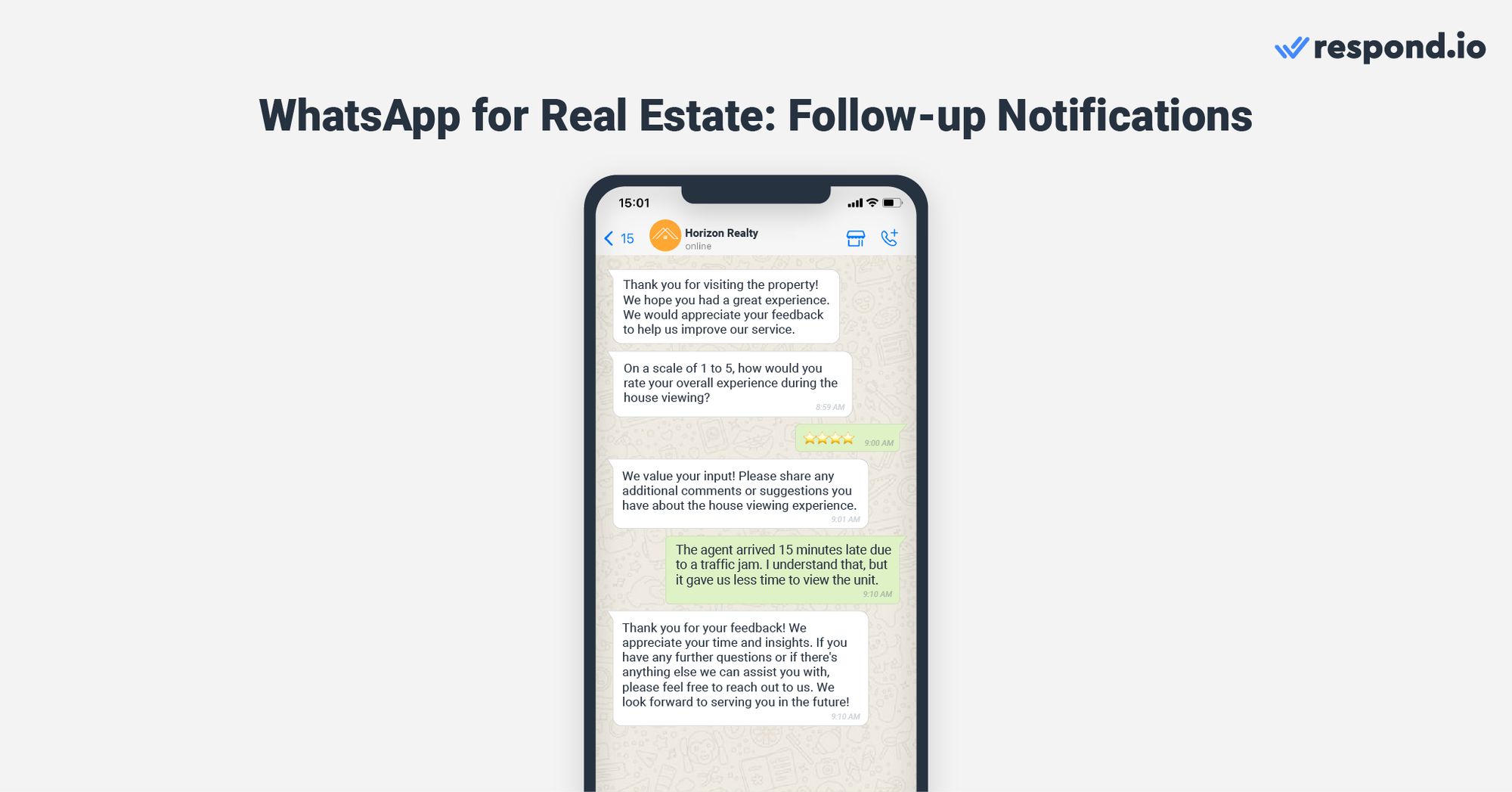
Real estate agents want to have control over when to send follow-up notifications. In cases like this, it’s recommended to build a Workflow using Contact Tag Updated, Contact Field Updated or Shortcut as a Workflow Trigger.
WhatsApp Business for Real Estate: Integrate your CRMs
Some real estate businesses use WhatsApp CRMs to store customer details, manage sales processes and other purposes. Rather than juggling between respond.io and your CRM of choice when chatting with customers, integrate them to let your agents work efficiently.
By doing so, you’ll be able to sync client information across both platforms. This comes with multiple benefits, the main one being the possibility to retrieve data from your CRM to enrich respond.io Contact Fields.
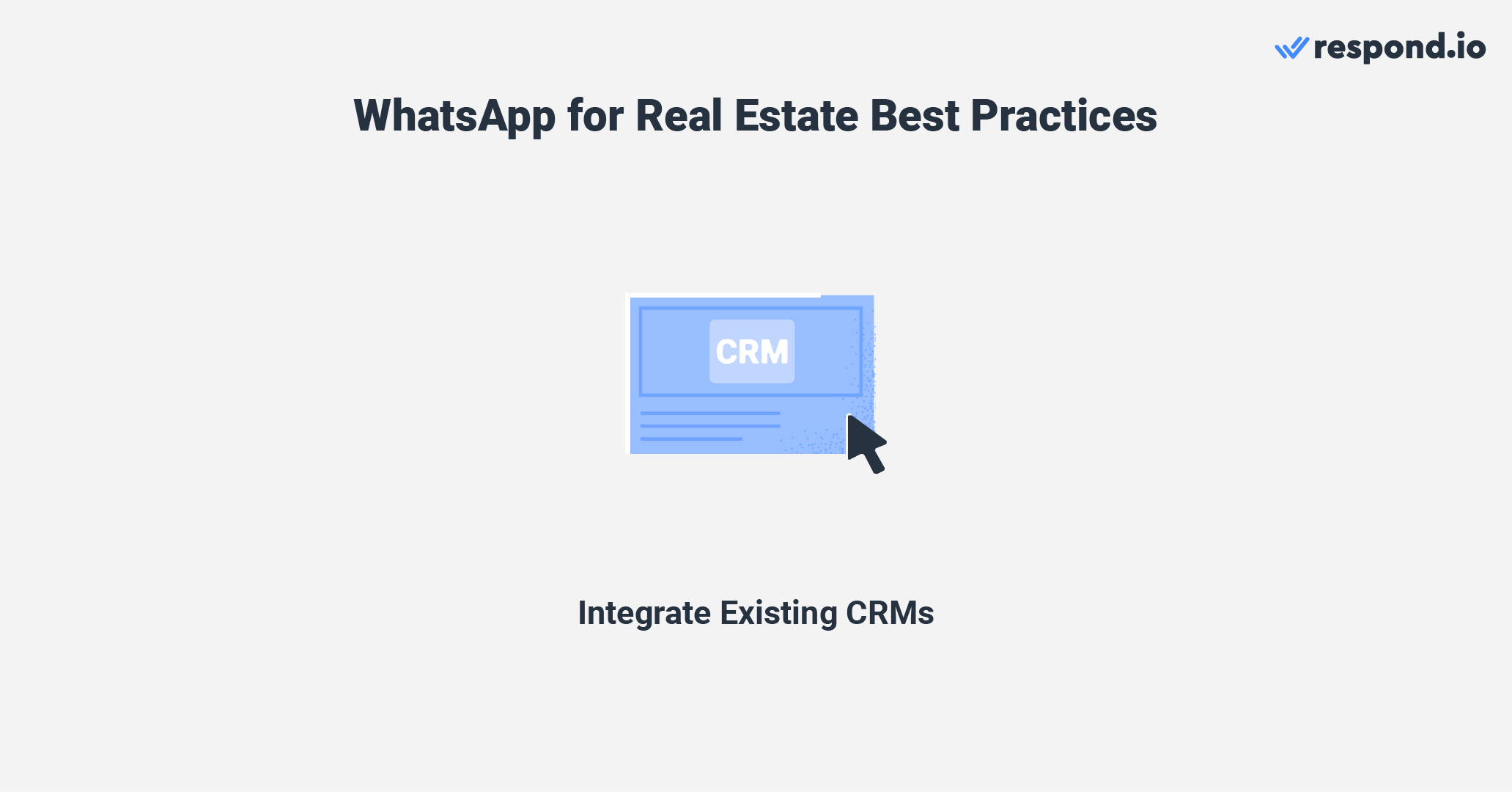
Here’s another application: Your CRM can detect when a prospect has shown interest in a property listing on your business site. Then, it can notify your sales team on respond.io so they follow up at the earliest.
WhatsApp Business for Real Estate: Send Promotional Messages
Real estate agents can create a broadcast list in WhatsApp to send messages to multiple clients at once. This list can include clients who have expressed interest in a particular area or property type, or who have previously worked with the agent.
When a new properties becomes available, real estate agents can share a WhatsApp Catalog to their broadcast list, letting clients know about the new property. This can include details such as the property's features, location, and price, as well as any relevant photos or videos .
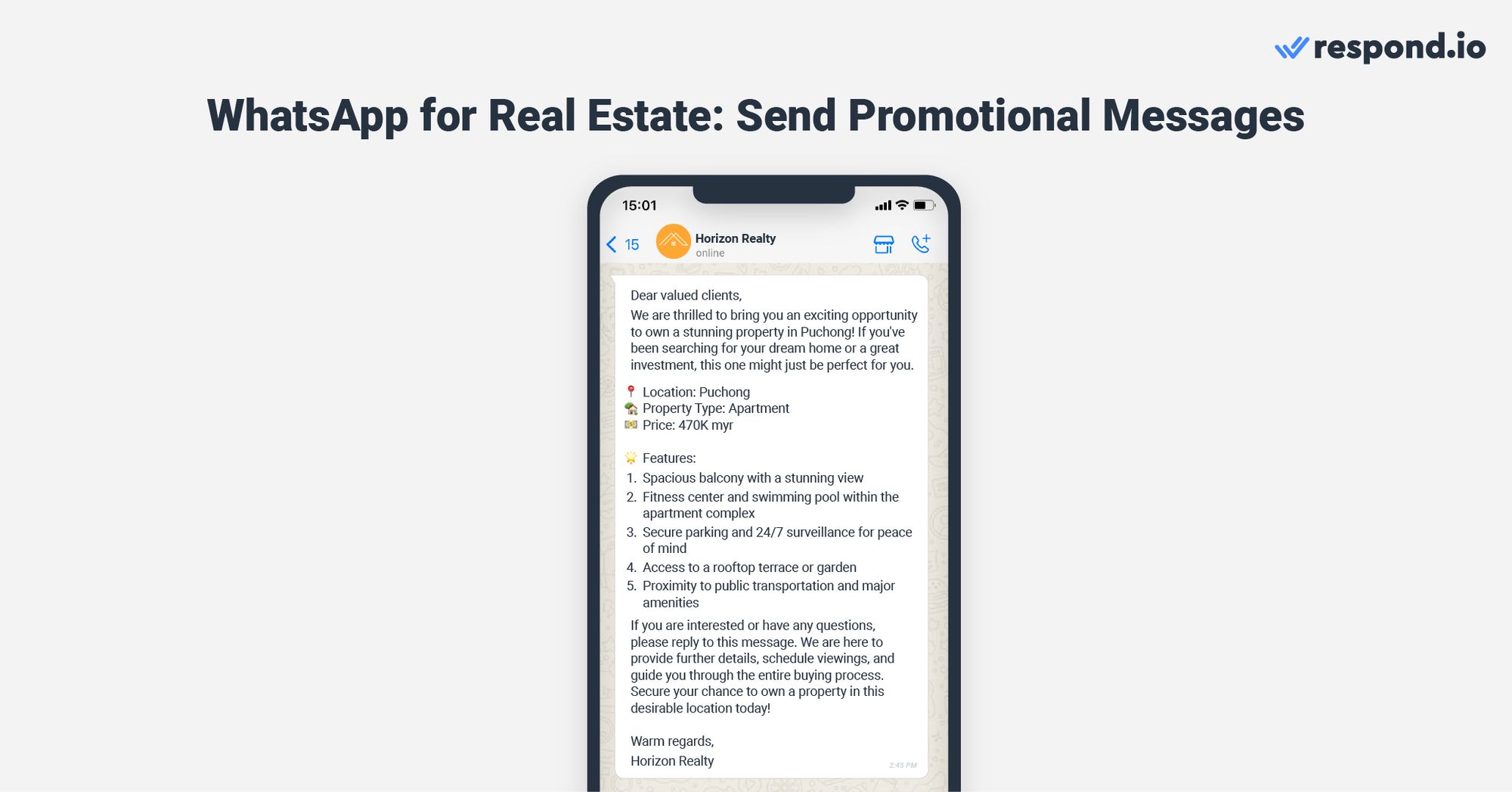
In conclusion, real estate businesses should consider integrating WhatsApp API as one of their communication channels. By connecting it to respond.io, they get access to advanced automation and other valuable features for the whole customer journey. To get started, sign up for a free respond.io trial or connect WhatsApp API to your respond.io account now.
Turn conversations into customers with respond.io's official WhatsApp API ✨
Manage WhatsApp calls and chats in one place!
Further Reading
If you’ve found this article interesting, here are some additional readings you may like:






































 Electronics
Electronics Fashion & Apparel
Fashion & Apparel Furniture
Furniture Jewelry and Watches
Jewelry and Watches
 Afterschool Activities
Afterschool Activities Sport & Fitness
Sport & Fitness
 Beauty Center
Beauty Center Dental Clinic
Dental Clinic Medical Clinic
Medical Clinic
 Home Cleaning & Maid Services
Home Cleaning & Maid Services Photography & Videography
Photography & Videography
 Car Dealership
Car Dealership
 Travel Agency & Tour Operator
Travel Agency & Tour Operator




